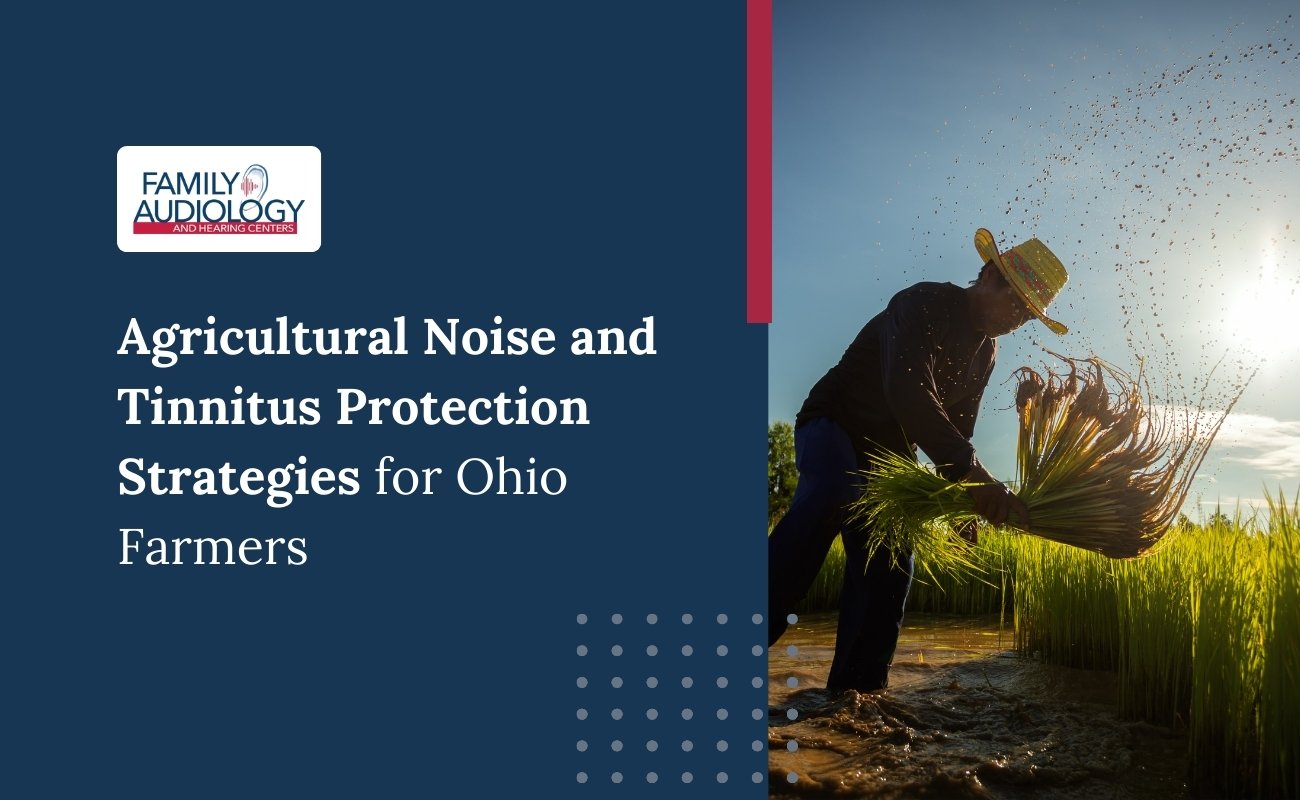Agricultural Noise and Tinnitus Protection Strategies for Ohio Farmers



Ohio farmers work in one of the loudest occupations in America, yet most don't realize the long-term damage constant machinery noise inflicts on their hearing. Between roaring tractors, grain dryers, and livestock operations, farm workers face daily noise levels that can permanently damage hearing and trigger persistent tinnitus.
The Reality of Farm Noise
Walk onto any active farm during planting or harvest season, and you'll immediately notice the noise. Tractors rumble at 85-95 decibels, combines reach 100 decibels, and grain handling equipment can hit 110 decibels. For context, sustained exposure to anything above 85 decibels damages hearing, while sounds over 100 decibels cause harm in just 15 minutes.
Most farmers work 10-12 hour days during peak seasons, often without breaks from noise exposure. Unlike factory workers who benefit from OSHA regulations and mandatory hearing protection programs, agricultural workers typically lack structured hearing conservation measures.
Tinnitus: The Farmer's Silent Struggle
Tinnitus manifests as ringing, buzzing, whistling, or roaring sounds in the ears when no external sound exists. This condition affects up to 25% of adults, but farmers face much higher rates due to occupational noise exposure.
The symptoms extend far beyond annoying sounds. Farmers with tinnitus struggle to concentrate during long workdays, experience sleep problems that interfere with early morning chores, and find communication difficult when coordinating with family members or employees. Perhaps most concerning, tinnitus can mask important safety sounds like approaching vehicles or equipment malfunctions.
Some farmers describe their tinnitus as a constant high-pitched whine, while others hear intermittent buzzing that worsens after particularly noisy days. The condition often becomes most noticeable during quiet evening hours when the day's work ends.
Major Noise Sources on Ohio Farms
Heavy Machinery
Diesel engines power most farm equipment, creating sustained high-decibel exposure during operation. Older tractors without enclosed cabs expose operators to direct engine noise for hours at a time. Combines, which farmers operate during lengthy harvest periods, generate some of the highest noise levels on farms.
Grain handling creates intense noise bursts. Augers, elevators, and dryers produce sharp, piercing sounds that can reach 110 decibels. The enclosed nature of many grain facilities amplifies these sounds, creating particularly dangerous exposure conditions.
Livestock Operations
Different animals create unique noise challenges. Pig confinement buildings generate constant noise exceeding 100 decibels, particularly during feeding times. Poultry operations produce similar volumes, with additional high-frequency sounds from ventilation systems.
Cattle operations, while generally quieter, can produce sudden loud sounds during feeding or when animals become agitated. Milking parlors combine equipment noise with animal sounds, creating complex acoustic environments.
Maintenance and Repair Work
Farm maintenance involves numerous high-noise activities. Welding, grinding, hammering, and compressed air tool use often occur in enclosed barns or shops that amplify sound levels. Chainsaw operation for tree removal or firewood cutting exposes users to extremely loud noise in short bursts.
Smart Protection Strategies
Custom-Fitted Solutions
Generic foam earplugs fall out during physical work and muffle all sounds, including important communication and safety alerts. Custom-molded hearing protection offers a better solution for active farmers.
We create custom earplugs from medical-grade silicone that fit your ear canal perfectly. These devices won't fall out during physical activity and maintain clear frequency response, allowing important sounds through while blocking harmful noise. Interchangeable filters let you adjust protection levels for different tasks, with reductions ranging from 10 to 27 decibels.
Equipment Modifications
Enclosed tractor cabs with sound dampening materials dramatically reduce noise exposure. Regular maintenance schedules help keep equipment running quietly - properly tensioned belts, functioning mufflers, and adequate lubrication all reduce operational noise.
Consider noise levels when purchasing new equipment. Many manufacturers now prioritize quieter operation in their designs, making this an important factor in equipment decisions.
Facility Design Considerations
Strategic barn and facility design can minimize noise exposure. Sound-absorbing materials, proper ventilation placement, and equipment isolation reduce overall noise levels. Scheduling the loudest activities during periods when fewer people are present also limits exposure.
Recognizing Warning Signs
Farmers often dismiss early hearing damage symptoms as temporary effects from loud workdays. Muffled hearing after equipment operation, difficulty understanding conversations in noisy environments, or asking people to repeat themselves frequently all indicate developing problems.
Tinnitus symptoms require immediate attention. Persistent ringing, buzzing, or whistling sounds, especially if they interfere with sleep or concentration, signal potential hearing damage. Some farmers notice their tinnitus fluctuates with their work schedule, becoming worse during busy seasons.
Changes in tinnitus patterns - increased volume, different sounds, or new frequencies - may indicate progressing damage. Don't wait for symptoms to worsen before seeking professional evaluation.
Professional Evaluation and Treatment
Comprehensive hearing evaluations assess your current hearing status and identify the type and degree of any damage. We examine your ear canals for blockages or injuries, test hearing across different frequencies, and evaluate speech understanding in various noise conditions.
Tinnitus Management Options
Multiple approaches can reduce tinnitus symptoms and improve daily life. Sound therapy introduces pleasant background sounds that help your brain adapt to tinnitus over time. These devices are particularly helpful for farmers who experience tinnitus most prominently during quiet periods.
Behavioral therapies teach coping strategies and help retrain your brain's response to tinnitus sounds. Cognitive behavioral therapy has shown significant success in reducing tinnitus-related distress and improving sleep quality.
Some patients benefit from medications that address anxiety or depression associated with severe tinnitus. Stress management techniques become particularly important since farming stress can worsen tinnitus symptoms.
Modern Hearing Aid Technology
Today's hearing aids offer sophisticated features designed for challenging environments like farms. The Oticon Intent incorporates sensors that adapt to your movement and listening situations, automatically adjusting settings as you move between quiet offices and noisy equipment areas.
The Phonak Infinio platform provides exceptional speech clarity and noise reduction, helping farmers maintain communication even in loud environments. These devices can stream phone calls directly, allowing hands-free communication while operating equipment.
For farmers with both hearing loss and tinnitus, modern hearing aids often include tinnitus management features that provide sound therapy while improving overall hearing.
Building Farm-Wide Hearing Conservation
Successful hearing protection requires commitment from everyone on the farm operation. Start by assessing noise levels throughout your property, identifying the loudest areas and activities. Document these findings to track improvements over time.
Provide appropriate hearing protection for each type of work and train all workers on proper usage. Make hearing protection as standard as wearing safety glasses or steel-toed boots. Regular equipment maintenance schedules reduce noise output while extending machinery life.
Consider implementing quiet hours when possible, scheduling the loudest activities during periods with minimal worker exposure. Some operations find success rotating workers through high-noise tasks to limit individual exposure times.
Creating Effective Training Programs
Education helps workers understand hearing damage risks and the importance of consistent protection use. Many farmers resist hearing protection because they believe they need to hear everything around them for safety reasons.
Address these concerns by demonstrating how proper hearing protection maintains awareness while reducing harmful noise. Show workers how custom protection preserves important frequency ranges while blocking damaging sounds.
Regular safety meetings should include hearing health topics, discussing new protection technologies and reinforcing proper usage techniques. Encourage workers to report hearing changes or tinnitus symptoms without fear of losing work opportunities.
Technology Solutions for Communication
Modern farming operations require constant communication between workers, but traditional methods become difficult with hearing protection. Two-way radio systems, hands-free communication devices, and smartphone apps can bridge this gap.
Some custom hearing protection incorporates communication systems that filter harmful noise while preserving radio transmissions. These solutions allow farmers to maintain safety coordination without removing protection during loud activities.
Long-term Health Considerations
Untreated hearing loss and tinnitus affect more than just communication. Research links hearing loss to increased accident rates, social isolation, and cognitive decline. For farmers planning to work into their later years, preserving hearing becomes important for maintaining independence and quality of life.
The agricultural community's strong work ethic sometimes leads to ignoring health problems until they become severe. Treating hearing health proactively prevents problems that could force early retirement or limit farm participation.
Protecting Future Generations
Young farmers and family members face the same noise exposure risks as their older relatives. Children working on farms need age-appropriate hearing protection and education about noise dangers. Starting protective habits early creates lifelong awareness about hearing health.
Consider the example you're setting for the next generation of farmers. Consistent hearing protection use normalizes these safety practices and helps protect young ears from damage.
Take Action for Your Hearing Health
Farming demands sharp senses and clear communication for both productivity and safety. Don't let preventable hearing damage compromise your ability to work effectively or enjoy conversations with family and friends.
We understand the unique challenges Ohio farmers face and offer solutions designed specifically for agricultural environments. Our comprehensive hearing evaluations identify current damage and assess risk factors specific to your operation. Custom hearing protection provides comfortable, effective protection that won't interfere with your daily work.
Schedule your hearing evaluation today at one of our 17 Ohio locations. Let our experienced team help you develop a hearing conservation plan that protects your most valuable sense while keeping you safe and productive on the farm.
Discover the Latest Articles
Stay informed with our informative articles.

Why February is the Perfect Time to See Your Audiologist
.jpg)
What Your Audiologist Checks During a Comprehensive Hearing Evaluation

How AI Technology Is Transforming Hearing Aid Performance
Contact your local Hearing Aid Specialists
At Family Audiology and Hearing Centers, we strive to be there for all your family’s hearing needs. Because of this, we have 17 convenient locations in Ohio and Wisconsin for you to visit. See which location is best for you and schedule an appointment today.


